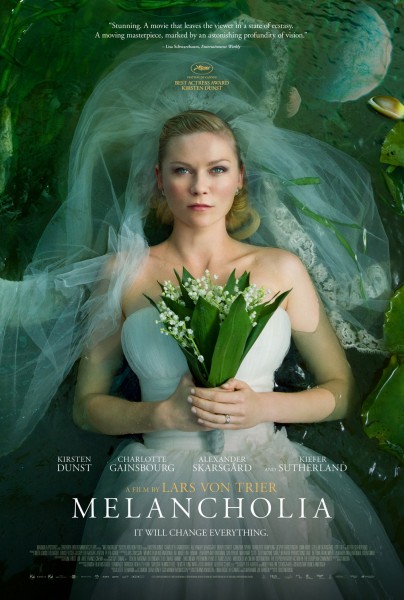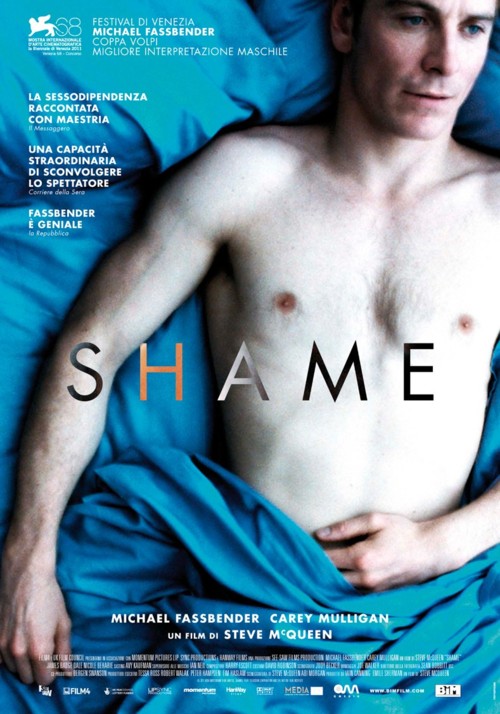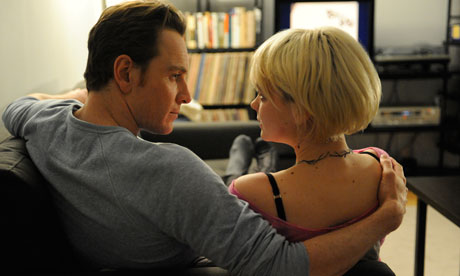 |
| Melancholia (2011) |
This is a guest post from Olivia Bernal.
As I’m leaving the theatre, the booming volume of two planets crashing still causing a hollow echo in my ears, the gentlemen who sat behind me remarks to his wife, “Well, that was…odd.”
“What did you say?” his wife replies, apparently as temporarily deaf as I.
This was the same guy who asked his wife during the beginning collage of the movie – a symphony of images, slow-paced and gorgeously rendered, whose disparate tones fit together like an orchestra – whether the whole movie would be like this and could they leave if it was.
Odd is probably one of the more tame opinions ever bestowed on a Lars von Trier movie. After Antichrist, which gave me nightmares solely from the descriptions, I was hesitant to see Melancholia. I had never seen a Lars von Trier movie and his reputation was one of Nazism, misogyny, and violence.
So I was surprised at this beautiful, thoughtful, and often funny movie. Told in two acts, it begins at Justine’s (Kirsten Dunst) wedding reception, which is held at Justine’s sister Claire’s (Charlotte Gainsbourg) mansion. It is clear early on that Justine suffers from a potentially debilitating depression, one that is being held carefully in check. Claire and her husband care for Justine as a Mother would, constantly fortifying her, usually through guilt, to return to the crowd of people there to celebrate her wedding. As the evening wanes, she escapes time and again to take a bath, have sex with a random guest on the golf course, and cuddle with her nephew, all to the ruination of her new marriage. Her husband, at first patient and understanding, abandons her to her demons by dawn.
Later, as the second act begins, Justine is delivered back to the mansion sometime after her failed wedding. This time, her depression has fully consumed her. She can barely stand, much less eat or walk or bathe. She recuperates as news comes that a rogue planet called Melancholia may collide with Earth – a potential destruction that would cease all life on the planet. In the wake of this potential tragedy, Justine becomes calm – even coherent – at the inevitability of the collision. She comforts her nephew, as her sister and brother-in-law lose themselves in terror. At one point, in the best scene of the movie, Claire stuffs her son into a golf cart and drives madly away from the mansion, as if escaping their isolation could somehow save them. And of course, it can’t. Melancholia looms over their heads, its inevitability a sordid reminder of their impending mortality.
It’s no secret that Lars von Trier manages to produce an excessively offensive quote every time he’s interviewed. Reports that he hired a “Misogyny Consultant” abounded after the release of Antichrist. While being interviewed during the Cannes film festival to promote Melancholia, von Trier announced, “What can I say? I understand Hitler.” I have never seen another Lars von Trier movies and it is difficult to assess someone’s philosophy based on only one of his works or based only on publicity-inducing quotes. But I would argue that von Trier is full of shit. Melancholia is one of the most stunning, understated, and complex depictions of women I have seen in ages.
This is not to say it does not have its flaws. Though the images are unbelievably beautiful, some of the dialogue is terrible. The ideas presented are challenging, but the way in which they are presented is awkward. Towards the end, Justine and Claire confront each other about their varying degrees of concern at the future tragedy.
Justine: All I know is, life on earth is evil.
Claire: Then maybe life somewhere else.
Justine: But there isn’t.
Claire: How do you know?
Justine: Because I know things.
Claire: Oh yes, you always imagined you did.
Justine: I know we’re alone.
Claire: I don’t think you know that at all.
Justine: 678. The bean lottery. Nobody guessed the amount of beans in the bottle.
Claire: No, that’s right.
Justine: But I know. 678.
Claire: Well, perhaps. But what does that prove?
Justine: That I know things. And when I say we’re alone, we’re alone. Life is only on earth and not for long.
The bean lottery, a game at Justine’s wedding, is a silly and ultimately ridiculous way of proving that Justine knows anything. This revelation is supposed to reveal a level of prescience in Justine’s character, a fact that had never been established before. It is the only inconsistency in her character and weakened an otherwise excellent movie. It is then the images, and those big ideas that von Trier is not afraid to take on, that raise this movie to such an exciting level.
If Melancholia is a meditation on the nature of depression, the first act, I believe, is meant to exhibit the self-destruction and eventual depletion of those who suffer from it. Justine’s ruin seemed imminent, even as she smiled and laughed in her white dress and perfectly-coiffed hair. Her father, drunk and addled, remarks upon her happiness, only to have Justine later admit to her new husband that she is not happy at all. Von Trier is so skillful at making his audience despise and empathize with Justine at the same time. You can see the strain on her face as she once again escapes the confines of the crowd and realize the intense effort of her façade, yet you want her to suck it up and be normal. It is the intricacy of this first act, the turmoil within Justine at having to conform that makes her a refreshingly three-dimensional character.
Her mental illness is born in sharp relief to her sister, who is practical and efficient in the first act. The genius of the movie is in the second-act reversal by non-reversal. As Melancholia threatens our planet, Justine loses none of her pessimism, yet now, with death looming, this seems lucid, even logical. What once was absurd about Justine now becomes rational. As Claire becomes desperate to regain control over her world, her competence is now insanity. It is the context that changes – their characters remain frustratingly consistent. Justine’s depression is rational; Claire’s control is fanatical. As an audience member, I almost wanted Justine to admit what she will lose by this tragedy or Claire to stop trying to fix the situation and give in to her destiny.
I believe that in any creation of a character, the portrayal of a character as simple is a worse crime than the portrayal of that character as negative. Honoring the intricacy and spirit and individuality is a greater boon to women than depicting us as good or positive or non-offensive. Justine and Claire are excessively flawed and in many ways are tremendously unlikeable. But, von Trier, ever skillful, will not give in to convention and never gives his audience easy solutions. What he gives us instead, is an intimate view of civilization – of two responses to terror, tragedy, and mental illness. That he does so within the framework of these women, exhibits a level of concern for humanity that his sound bytes from interviews don’t express.
At the end, the earth does end in a deafening explosion of sound as Justine, Claire, and Claire’s son hold hands under a tent of sticks, built by Justine to calm Claire’s son. Justine is placid, almost trance-like; Claire is despondent. This is indeed an odd movie, just as the gentleman said. It is odd because it defies type. Von Trier, for all his bullshit ballyhoo, might have proven himself, perhaps unwittingly, a feminist.
Melancholia trailer:
Olivia Bernal is a public school teacher from Kansas. She writes for The Independent Book Review.




